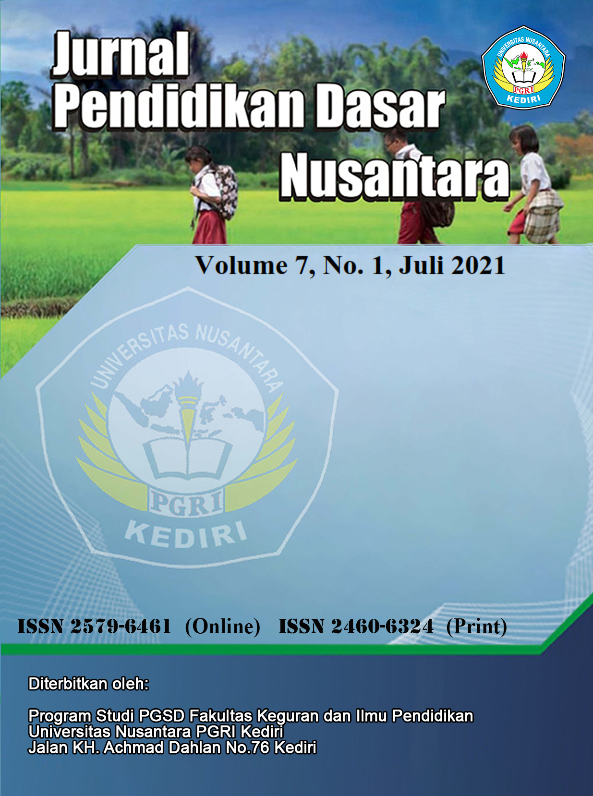Bagaimana Pola Asuh Orang Tua dan Kecerdasan Intrapersonal Menjelaskan Prestasi Belajar Siswa?
DOI:
https://doi.org/10.29407/jpdn.v7i1.15361Keywords:
parenting style, intrapersonal intelligence, learning achievement, elementary education, elementary school students.Abstract
The purpose of this study was to explore parenting styles with intrapersonal intelligence on student learning achievement in indonesian subjects. This research used a qualitative approach with a case study design. The subjects in this study were 15 grade III students at one of the Madrasah Ibtidaiyah (MI) in Tangerang City, teacher, and parents of students. Data collection techniques were carried out through interviews with students, teachers, and parents of students; filling out a questionnaire by students and parents of students; observation of the process of learning activities followed by students; and documentation of documents that support student achievement data. The research validation was carried out through the triangulation method. The results of this study indicate that parenting patterns that have an impact on high student achievement include a combination of democratic and authoritative parenting styles. Authoritarian parenting also explains student achievement, but in the moderate category. Permissive parenting tends to encourage students to have difficulties in facing problems, so that students achieve learning achievement in the low category. Student achievement is also directly proportional to the level of students' intrapersonal intelligence. The more students are able to recognize themselves, reflect on their actions, and control themselves, the more capable students are to achieve optimal learning achievement.
Downloads
References
Ahvan, Y. R., dan Pour, H. Z. (2016). The Correlation of Multiple Intelligences for the Achievements of Secondary Students. Educational Research and Reviews, 11 (4): 141-145. DOI: 10.5897/ERR2015.2532
Amani, M., Nazifi, M., dan Sorkhabi, N. (2019). Parenting Styles and Academic Achievement of Early Adolescent Girls in Iran: Mediating Roles of Parent Involvement and Self-Regulated Learning. European Journal of Psychology of Education, 35 (1): 49-72. https://doi.org/10.1007/s10212-019-00422-y.
Armstrong, T. (2003). Multiple Intelligences of Reading and Writing: Making the Words Come Alive. Alexandria, VA: Association for Supervision and Curriculum Development.
Azid, N. H., & Yaacob, A. (2016). Enriching Orphans’ Potentials through Interpersonal and Intrapersonal Intelligence Enrichment Activities. International Journal of Instruction, 9 (1): 17-32. Https://doi.org/10.12973/iji.2016.913a.
Darling, N., & Steinberg, L. (1993). Parenting Style as Context: An Integrative Model. Psychological Bulletin, 113 (3): 487-496.
Dummett, C. W. (2006). Successful pedagogies for an Australian multicultural classroom. International Education Journal, 7 (5): 778-789.
Gleason, M. E. (2011). Intrapersonal Intelligence Strategies in the Developmental Writing Classroom. Inquiry: The Journal of the Virginia Community Colleges, 16 (1): 95-105.
Helmawati. (2016). Pendidikan Keluarga. Bandung: PT Remaja Rosdakarya.
Kornhaber, M. L., Ferros, E., & Veenema, S. (2004). Multiple Intelligence: Best Ideas from Theory and Practice. Needham Heights, MA: Allyn & Bacon.
Kosterelioglu, I. (2018). Effects of Parenting Style on Students' Achievement Goal Orientation: A Study on High School Students. Educational Policy Analysis and Strategic Research, 13 (4): 91-107. doi: 10.29329/epasr.2018.178.5.
Mihret, A. M., Dilgasa, G. S., dan Mamo, T. H. (2019). Parenting Style as Correlates of Adolescents’ Academic Achievement Motivation of Bate Secondary School, Haramaya, Ethiopia. International Journal of Education & Literacy Studies, 7 (2): 172-176. http://dx.doi.org/10.7575/aiac.ijels.v.7n.2p.172.
Miller, A., Neumeister, K. L. S. (2017). The Influence of Personality, Parenting Styles, and Perfectionism on Performance Goal Orientation in High Ability Students. Journal of Advanced Academics, 00 (0): 1-32. ps://doi.org/10.1177/1932202X17730567.
Nurihsan, A. J., dan Agustin, M. (2016). Dinamika Perkembangan Anak dan Remaja. Bandung: Refika Aditama.
Odongo, A. A., Aloka, P. J. O., dan Raburu, P. (2016). Influence of Parenting Styles on the Adolescent Students’ Academic Achievement in Kenyan Day Secondary Schools. Journal of Education and Practice, 7 (15): 101-108.
Otto, W. J. (2016). What Teachers Should Know About Why These Students Perform so Well: An Examination of Korean-American Achievement through Student Perspectives of East Asian Parenting Beliefs, Styles and Practices. International Electronic Journal of Elementary Education, 8 (4): 167-181.
Otto, W. J. (2017). Evolving Korean Parenting Foundations Revealed through Children’s Perspectives of East Asian Parenting Beliefs, Styles and Practices. Journal of Education and Learning, 7 (2): 34-49. doi:10.5539/jel.v7n2p34.
Santrock, J. W. (2007). Perkembangan Anak. Jakarta: PT. Erlangga.
Visser, B. A., Ashton, M. C., dan Vernon, P. A. (2006). Beyond g: Putting multiple intelligences theory to the test. Intelligence, 34 (2006): 487– 502. doi:10.1016/j.intell.2006.02.004.
Wang, T., Xu, Q., & Hu, J.-F. (2019). Emotions and parenting in learning among Chinese children. In Y. Liu (Ed.), Child and Adolescent Development in China. New Directions for Child and Adolescent Development, 163, 39–65. DOI: 10.1002/cad.20269.
Yang, S. & Sternberg, R. J. (1997). Taiwanese Chinese People’s Conceptions of Intelligence. Intelligence, 25 (l): 21-36.
Yerizon, Putra, A. A., dan Subhan, M. (2018). Mathematics Learning Instructional Development based on Discovery Learning for Students with Intrapersonal and Interpersonal Intelligence (Preliminary Research Stage). International Electronic Journal of Mathematics Education, 13 (3): 97-101. https://doi.org/10.12973/iejme/2701.
Zefanya, F. (2018). Pengaruh Kecerdasan Intrapersonal dan Kedisiplinan Belajar terhadap Prestasi Belajar Matematika. Jurnal Kajian Pendidikan Matematika, 03 (02): 135-144.
Downloads
Published
Issue
Section
License
Authors who publish with this journal agree to the following terms:
- Copyright on any article is retained by the author(s).
- The author grants the journal, the right of first publication with the work simultaneously licensed under a Creative Commons Attribution License that allows others to share the work with an acknowledgment of the work’s authorship and initial publication in this journal.
- Authors are able to enter into separate, additional contractual arrangements for the non-exclusive distribution of the journal’s published version of the work (e.g., post it to an institutional repository or publish it in a book), with an acknowledgment of its initial publication in this journal.
- Authors are permitted and encouraged to post their work online (e.g., in institutional repositories or on their website) prior to and during the submission process, as it can lead to productive exchanges, as well as earlier and greater citation of published work.
- The article and any associated published material is distributed under the Creative Commons Attribution-ShareAlike 4.0 International License

































